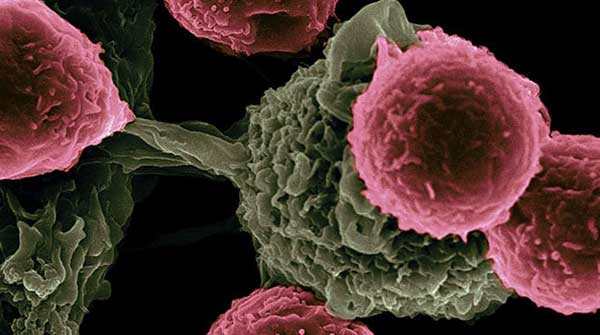Gut bacteria metabolites may boost immune response against colorectal cancer
Promising research from the University of Alberta suggests that metabolites produced by gut bacteria during digestion could be harnessed to stimulate an immune response against colorectal cancer cells, offering hope for a potential treatment for one of the deadliest forms of cancer.
The research team at the U of A discovered that these metabolites can activate a specific molecule on the surface of colorectal cancer cells, effectively attracting immune cells known as T cells. Furthermore, the metabolites have the unique ability to penetrate the nucleus of cancer cells and modify their DNA, amplifying the immune system’s response.
 Kristi Baker |
 |
| Related Stories |
| Newly identified protein could help fight cancer
|
| New health lab to focus on exercise as clinical tool in cancer aftercare
|
| New clue discovered for how and why cancer cells spread
|
Associate Professor Kristi Baker, from the departments of oncology and medical microbiology and immunology at the University of Alberta, explained, “What we saw is that these products regulate a key molecule on the tumour cells that T cells directly interact with, so it provides a way for the T cells to detect that the tumour cell is there, that there’s something wrong and that they want to eliminate it.”
“The products were also making changes in the cell’s gene expression, which co-ordinates interactions between the cancer cells and the immune system,” Baker added.
Colorectal cancer ranks as the second most lethal cancer among men and the third among women, according to the Canadian Cancer Society. Shockingly, an estimated 9,400 Canadians succumbed to this disease in 2022 alone.
The research was spearheaded by Courtney Mowat, a trainee under Professor Baker’s guidance, who conducted the study alongside undergraduate students Jasmine Dhatt, Ilsa Bhatti, and Angela Hamie.
Commenting on the study’s implications for dietary choices, Baker said, “We hear a lot that a diet high in fibre is very beneficial and potentially protective against cancer, so part of the question we were asking was how fibre could contribute to cancer protection.”
The research specifically focused on two of the most abundant metabolites produced by gut bacteria during the digestion of dietary fibre – namely, butyrate and propionate. To assess their impact, the researchers exposed cancer cells in the colons of mice to these metabolites to observe their lasting effects. Human cancer cells were also subjected to the metabolites in a controlled laboratory environment to verify the results.
Baker expressed her surprise at the study’s robust and consistent findings, stating, “I was really surprised by the fact that the response was so strong and that it was so reproducible.”
Looking ahead, Baker has plans to expand her research, aiming to gain a deeper understanding of the underlying mechanisms involved in the immune response. The ultimate goal is to leverage this research to develop prognostic tests and novel cancer treatments. Future studies will investigate the effectiveness of different concentrations of these metabolites when combined with immunotherapies against various types of cancer cells.
She concluded, “For example, if we find a patient who doesn’t have a lot of the bacteria that naturally produce these particular metabolites, maybe they could take a pill that would basically turn on those same pathways in order to boost the immune response,” highlighting the potential for tailored treatments based on an individual’s unique biology.
This groundbreaking research from the University of Alberta offers new hope in the fight against colorectal cancer, shedding light on the potential of gut bacteria metabolites to enhance immune responses and potentially lead to innovative cancer therapies. While further studies are needed, these findings represent a significant step forward in the quest for more effective treatments for this deadly disease.
| Troy Media
For interview requests, click here.
The opinions expressed by our columnists and contributors are theirs alone and do not inherently or expressly reflect the views of our publication.
© Troy Media
Troy Media is an editorial content provider to media outlets and its own hosted community news outlets across Canada.

